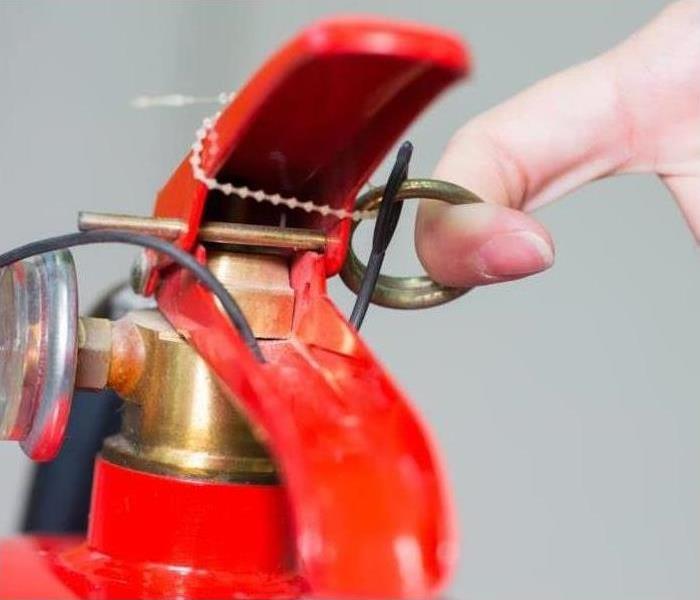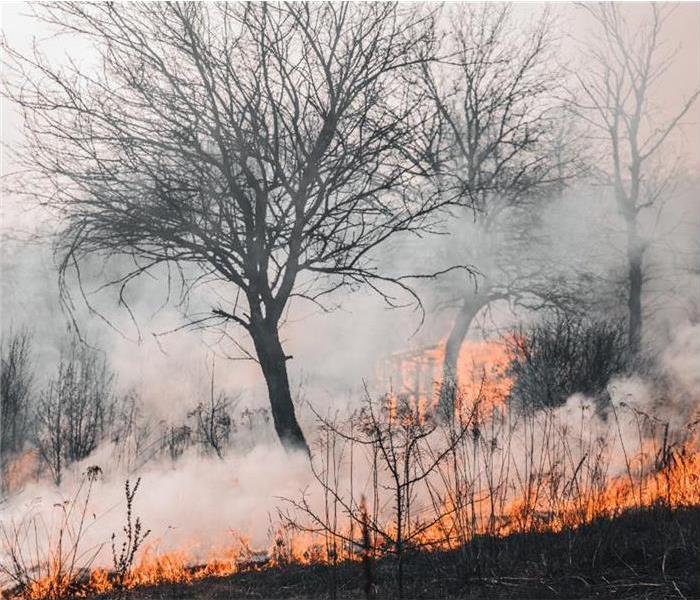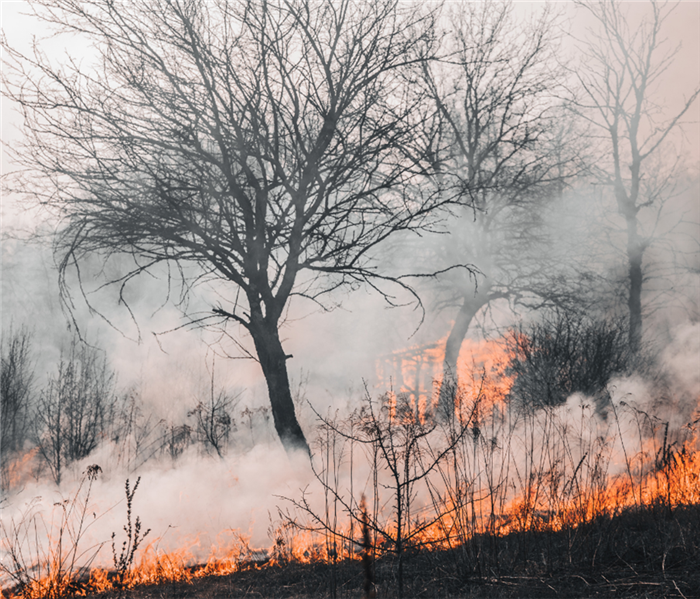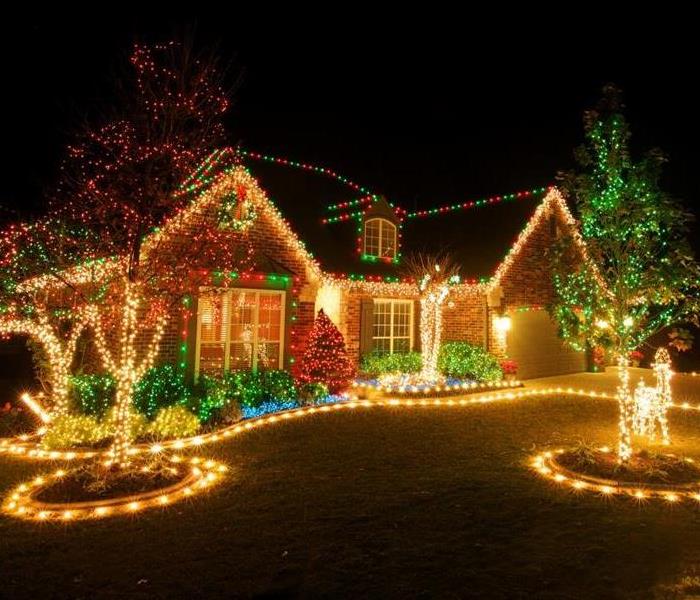Recent Fire Damage Posts
The Importance of Fire Extinguishers
6/6/2022 (Permalink)
 Fire extinguishers- we all know of them and their use, but how useful are they, really, if we don’t have them or know how to use them?
Fire extinguishers- we all know of them and their use, but how useful are they, really, if we don’t have them or know how to use them?
A fire extinguisher, by definition, is a portable device that discharges a jet of water, foam, gas, or other material to extinguish a fire. So why can we not just rely on a bucket of water to extinguish a fire? Well, say a grease fire erupts in your kitchen. Water will not put out this fire, but only make it worse, which is why it is crucial to have a foam-based extinguisher close by. A fire extinguisher spreads the foam at a much quicker, more concentrated rate than a bowl or bucket of water, thus making it safer and more effective in your home.
Although fire extinguishers are great things to have in your home, they can make a situation even more dangerous if placed in the wrong hands. Fighting an electrical fire with a water-based extinguisher, for example, could give you an electric shock, which does not solve the problem, but only creates a new, much bigger safety issue. If you look back to one of our earlier blogs (Fire Extinguisher Tips & Tricks), you will see how to properly use a fire extinguisher and a few handy tips for using one. Having a fire extinguisher in your home and knowing how to use one could be the difference between life and death.
May is National Wildfire Awareness Month
5/6/2022 (Permalink)
We may not live in an area that is most prevalent to having wildfires, but they can still happen in our area. There could be a brush fire that gets out of hand if conditions are too dry. There could be a farmer performing a prescribed burn to a field that gets too large or out of control. There could be a camper that doesn't extinguish a campfire properly before leaving a campsite. Any of these events has the potential to cause devastation to not only natural areas, but also communities. There are several ways we can help prevent wildfires.
1. Report unattended fires- If you ever notice a fire that is burning out of control or unattended, immediately call 911 or your local fire department. "See something, say something."
2. Extinguish fire pits and campfires when done- Use water or ashes to put out the flames. Keep tents and sleeping gear away from the fire. Loose kindling and branches around the campsite can also feed the flames. Keep the area clean and tidy to make sure there is nothing to catch fire from an errant spark.
3. Don't throw lit cigarettes out of your moving car- Never throw a lit cigarette, smoking materials, or matches out of your car or on the ground. many wildfires start by carelessly flicking a cigarette butt on the ground, especially during very dry conditions.
4. Use caution when using flammable liquids- Any flammable liquid can quickly ignite. When refilling stoves, lanterns, or heaters it should always be done outside and with extreme caution.
5. Pay attention to local ordinances for trash or leaf burning- Most areas have restrictions for when it's windy or very dry. Make sure to have a fire extinguisher with you when you burn trash.
6. Only use fireworks in clear areas with no woods nearby- Most people don't realize the danger in using sparklers or fireworks for holiday celebrations. These things should not be used unless in an open area with no flammable materials nearby.
By following preventions tips, you can help ensure that fires are not started or are extinguished before they become out of control.
How Do Electrical Fires Start?
10/4/2021 (Permalink)
. Common Electrical Outlets -
Most electrical fires are caused by faulty electrical outlets or worn out sockets that are not properly grounded. As outlets and switches get older, the wiring behind them wears as well, and wires are strung about that loosen overtime and could potentially break and cause a fire.
2. Old Electrical Wiring -
Outdated electrical wiring often causes electrical fires. If a home is over 20 years old, it may not have the wiring capacity to handle the increased amounts of electrical appliances in today's average home, such as computers, wide-screen televisions, video players, microwaves, and air conditioners.
3. Circuit Overload -
Unrestricted use of extension cords is a major fire hazard. When the TV, home theatre, computer, and other appliances are all plugged into a single extension cord, it creates excessive power load on a single socket which may not be designed to handle that load. This means the circuit is overloaded, and your home is at serious risk of an electric fire.
4. Old Appliances -
Old appliances that have frayed cords or loose or faulty wiring can catch fire. Moreover, due to the high flammability of old insulation used in these appliances, a simple electrical repair to address these issues may not be enough. It's best to purchase updated appliances to ensure your safety.
5. Light Fixtures -
Light fixtures, lamps and light bulbs are another common reason for electrical fires. Installing a bulb with a wattage that is too high for the lamps and light fixtures, is a leading cause of electrical fires. Always check the maximum recommended bulb wattage on any lighting fixture or lamp and never go over the recommended amount.
6. Portable Heaters -
Be conscious of where you place your space heaters in the wintertime, and never leave it on for an extended period of time, especially when you are sleeping or have left the house. Placing your portable heater next to curtains, rugs, beds, couches, and the like is one of the most common causes of fires. If you do use space heaters, use the radiator-type that diffuse heat over the entire surface of the appliance.
Smoke & Soot
10/4/2021 (Permalink)
Smoke and soot facts:
- Hot smoke migrates to cooler areas and upper levels of a structure.
- Smoke flows around plumbing systems, seeping through the holes used by pipes to go from floor to floor.
- The type of smoke may greatly affect the restoration process.
Different Types of Smoke
There are two different types of smoke–wet and dry. As a result, there are different types of soot residue after a fire. Before restoration begins, SERVPRO of LBL South will test the soot to determine which type of smoke damage occurred. The cleaning procedures will then be based on the information identified during pretesting. Here is some additional information:
Wet Smoke – Plastic and Rubber
- Low heat, smoldering, pungent odor, sticky, smeary. Smoke webs are more difficult to clean.
Dry Smoke – Paper and Wood
- Fast burning, high temperatures, heat rises therefore smoke rises.
Protein Fire Residue – Produced by evaporation of material rather than from a fire
- Virtually invisible, discolors paints and varnishes, extreme pungent odor.
Our Fire Damage Restoration Services
Since each smoke and fire damage situation is a little different, each one requires a unique solution tailored for the specific conditions. We have the equipment, expertise, and experience to restore your fire and smoke damage. We will also treat your family with empathy and respect and your property with care.
Have Questions about Fire, Smoke, or Soot Damage?
Call Us Today – 731-642-1284
When Fire Strikes
9/8/2021 (Permalink)
Fire!! What to Do Next??
When disaster strikes, and your home is involved in a fire, your mind is frantic, and you have no idea what the next step is. You never pictured this would happen and you probably never thought what happens now. Below we have provided some of those next steps for you to take once your home has been involved in a fire.
- First and foremost, safety is the most important. Find a safe place for your family and pets to stay. This should be a place that can help ease your mind and give you a place to think about what you need to do next. If you don’t have a family member or friend to stay with, check with a local disaster relief program like the American Red Cross or the Salvation Army as they can often provide you with free temporary housing. Accomplishing this one minor goal can help feel like you have some control of the situation.
- Your next step should be to contact your insurance agent. The faster you contact your insurance agent; the faster things can begin whether it is repairs or looking for a new home. They also may be able to help you with your expenses due to losses in the fire. Insurance companies can also help you find a cleaning or mitigation/restoration service.
- Contact the Police. To ensure the safety of your home, the windows and doors should be boarded up to ensure the building and belongings are left alone.
- Plan out finances. Ensure you are prepared to pay your bills and it may even be best to suspend your cable and internet bills since you will not be in your home for a while. Some insurance companies will assist with these payments during this time.
- Get a list of damaged items and be sure to report them to your insurance agent, also make sure you report all important documents that were loss and need to be replaced. These should be of high priority.
- Before reentering your home, make sure it is reported to be safe by a fire marshal. Also, make sure you have spoken with your insurance agent to be sure that it does not void any of your policy if you are to enter your home. Always check with your agent before doing anything.
- Finally, you may feel like it is your responsibility to go into the home and start packing up and collecting undamaged items. This can take weeks and can take away from the important things that are of higher priority. Instead, let SERVPRO pack up all belongings, clean them, and store them with us, until we have completed all our steps to ensure it looks "Like it never even happened." Then we will return all your cleaned items back to where they were. This process can be long and drawn out but with our elite team of professionals we are able to complete these tasks with ease. We also can assist with communication between insurance agents/adjusters to help put homeowners at ease.
If you have any questions check out the link below or if you or someone you know is in the process of going through any of these tasks and need help, feel free to call SERVPRO of LBL (731) 642-1284 and we will be happy to assist you during this difficult time.
Residential Fire Readiness
9/8/2021 (Permalink)
Residential Fire Readiness
Ever wonder what the chances of your home catching fire actually are? Well, according to the United States Fire Administration, it depends on how well you are at cooking! Yes, we said cooking. According to the USFA, 51.6% of residential fires come from cooking. Generally, this is a grease fire, and once a flame emits from grease running down onto an eye on the stove, someone incorrectly tries to put it out with water. The other causes are Heating (9.1%), Unintentional/Carelessness (7.1) and Electrical 6.5%. So, while there are other reasons, most fires do begin in the kitchen. Let’s discuss a few tips in the event the bacon decides to catch fire one Saturday morning while you are cooking breakfast.
- Get everyone out of the house (remember, have everyone assemble at a rally point).
- Contact 9-1-1.
- If the fire is contained to the pan/pot, cover the container with a lid (not a plastic lid).
- If possible, shut off the heat source. This will not immediately put an end to the flame, but it will help in the continued fueling of heat from the source. You will still have to contend with the fire already started.
- If small enough, pour generous amounts of salt and/or baking soda on the flames.
- If available, use a Class B fire extinguisher. These are readily available for purchase at any local Lowe’s, Walmart or other home store.
- DO NOT use water on an oil-based fire. This will cause the oil to splatter, expanding the flames rapidly which will likely result in your home being consumed in flames before the emergency responders can arrive.
It is also recommended that you do not place fire extinguishers in the kitchen, but rather, just outside the kitchen. In the event your kitchen catches fire, you will need to access the extinguisher, and if your kitchen is engulfed in flames, it could render getting to the extinguisher next to impossible. Do what you can with what you have, but most certainly do not put yourself or others in harms way. You and your family’s safety are the most crucial element to dealing with a fire. Educate everyone in the home on the plan in the event a fire breaks out. Make sure they know how to safely exit the home, what to do and not to do, and where to meet up once safely outside of the home. Everyone, down to the youngest child, should be familiar with it.
Should you experience fire damage, contact SERVPRO of LBL South to come inspect the residence and begin work on restoring it “Like it never even happened.”
RESOURCES:
United States Fire Administration
How to Put Out a Grease Fire
May is National Wildfire Awareness Month
4/28/2021 (Permalink)
We may not live in an area that is most prevalent to having wildfires, but they can still happen in our area. There could be a brush fire that gets out of hand if conditions are too dry. There could be a farmer performing a prescribed burn to a field that gets too large or out of control. There could be a camper that doesn't extinguish a campfire properly before leaving a campsite. Any of these events has the potential to cause devastation to not only natural areas, but also communities. There are several ways we can help prevent wildfires.
1. Report unattended fires- If you ever notice a fire that is burning out of control or unattended, immediately call 911 or your local fire department. "See something, say something."
2. Extinguish fire pits and campfires when done- Use water or ashes to put out the flames. Keep tents and sleeping gear away from the fire. Loose kindling and branches around the campsite can also feed the flames. Keep the area clean and tidy to make sure there is nothing to catch fire from an errant spark.
3. Don't throw lit cigarettes out of your moving car- Never throw a lit cigarette, smoking materials, or matches out of your car or on the ground. many wildfires start by carelessly flicking a cigarette butt on the ground, especially during very dry conditions.
4. Use caution when using flammable liquids- Any flammable liquid can quickly ignite. When refilling stoves, lanterns, or heaters it should always be done outside and with extreme caution.
5. Pay attention to local ordinances for trash or leaf burning- Most areas have restrictions for when it's windy or very dry. Make sure to have a fire extinguisher with you when you burn trash.
6. Only use fireworks in clear areas with no woods nearby- Most people don't realize the danger in using sparklers or fireworks for holiday celebrations. These things should not be used unless in an open area with no flammable materials nearby.
By following preventions tips, you can help ensure that fires are not started or are extinguished before they become out of control.
Fire Caution For Cold Weather
9/30/2020 (Permalink)
With more heating appliances and equipment running to keep our homes comfortable and systems running smoothly during the cold months, the risk of a house fire increases dramatically.
Causes
1. Heating System - Whether you heat your home with a wood/pellet stove or oil/gas/propane furnace, a breakdown in safety equipment or poor user maintenance can lead to a fire. Do not plug space heaters into power strips and be sure heaters are on stable, level ground.
2. Cooking - The top cause of house fires in the United States is cooking. Colder weather brings us indoors to cook, and some of the best meals for the winter are slow-cooked, which means your stove and other appliances are plugged in and working for longer periods of time. Inspect all appliances for broken wires and other defective material. Never leave food cooking on a stove top unattended, especially if cooking with any kind of grease. If you use your grill to cook outside in the winter, be sure it is located away from the house with proper ventilation for smoke and heat.
3. Smoking - If you smoke, consider smoking outside, but remember to properly dispose of your ashes. Do not simply flick them on the ground, which could be dry, and paired with a strong wind, primed to start a major fire. Do not smoke around oxygen tanks or combustible material in garages and sheds.
4. Electrical - Winter means holidays, and holidays mean decorations – do not overload outlets or daisy-chain power strips, and do not leave decorations plugged in when you are not home or are asleep. Inspect all lights before putting them on your trees and homes, and be sure you are using the appropriate cord for indoor/outdoor use. Never leave candles burning unattended or where pets and children can knock them over.
Fire Extinguisher Tips & Tricks
9/9/2020 (Permalink)
Fires and fire damage are common tragedies among homeowners. But, there are ways to lessen the damage. SERVPRO® of LBL South is Here to Help so fires don’t ruin your summer. One is having a proper fire extinguisher --especially, during grilling season. Make sure you follow these rules from our friends at the American Red Cross when it comes to having a good extinguisher:
- Always have more than one working extinguisher in your home.
- Install extinguishers high on the wall and away from any heat sources.
- If an extinguisher doesn’t work on a fire immediately, drop it and get out. Most portable extinguishers empty in 8 seconds.
- Make sure the gauge on your extinguisher is properly charged.
Once you have the right fire extinguisher, always remember PASS:
P- Pull the pin and hold the extinguisher with the nozzle pointing away from you.
A- Aim low. Point the extinguisher at the base of the fire.
S- Squeeze the lever slowly and evenly
S- Sweep the nozzle from side to side.
We hope these tips keep fires and fire damage from your homes. But, if you have fire damage and need SERVPRO, we are always Here to Help. Call SERVPRO® of LBL South at (731) 642-1284.
Holiday Decoration Safety Tips
12/2/2016 (Permalink)
If your home, like millions of other households in the U.S., includes a Christmas tree and festive holiday decorations, you should be aware that the breathtaking beauty of the decorations also comes with a fire risk. That is why Rick Isaacson, executive vice president of SERVPRO Industries, Inc., is offering helpful tips to local residents.
“Basking in the glow of a warm fire or relaxing in a festively decorated home or office building may actually present a formula for a hazardous situation if you don’t take the proper precautions,” Isaacson said. “We want to show local residents how to keep their night before Christmas from becoming a nightmare before Christmas!”
Candles and Christmas trees have been reported to be two of the contributing factors of fires during the winter months. According to the U.S. Fire Administration, Christmas trees account for an estimated 200 fires annually and cause more than $6 million in property damage. Candles alone cause an estimated 15,600 fires each year, causing 1,270 injuries and more than $539 million in property damage. December is the peak month for candle fires, and Christmas is the peak day.
The following are a few tips for the members of the local community to consider when putting up and maintaining their holiday decorations:
- Do not overload power outlets with holiday lights. Pay close attention to the manufacturer’s instructions on the number of lights you can string together.
- Consider using battery-operated flameless candles.
- Be careful not to splatter wax when extinguishing a candle.
- Use flashlights instead of candles for emergency lighting.
- Do not purchase a Christmas tree that is dry or dropping needles excessively. Be sure to water your Christmas tree regularly.
- Do not use strings of lights that are worn, frayed, manually spliced or broken.
- If you purchase an artificial tree, be sure it is labeled fire-retardant.
- Do not link more than three light strands unless the directions indicate it is safe. Connect strings of lights to an extension cord before plugging the cord into the outlet. Be sure to periodically check the wires; they should not be warm to the touch.
“While holiday decorations can provide plenty of charm and cheer with assorted bright lights, Christmas trees and life-size Santa Claus figures, it is our responsibility to inform residents of potential dangers. We, too, want to see the glowing lights that are symbols of the winter holiday season, but we also want the community to be safe. “Isaacson said. “No matter what local residents’ reasons are for celebrating this month, we want everyone to enjoy the month of December safely.”
Check us out on Facebook!
Fire or Water Damage? Let SERVPRO be your hero!
 Fire extinguishers- we all know of them and their use, but how useful are they, really, if we don’t have them or know how to use them?
Fire extinguishers- we all know of them and their use, but how useful are they, really, if we don’t have them or know how to use them?






 24/7 Emergency Service
24/7 Emergency Service


